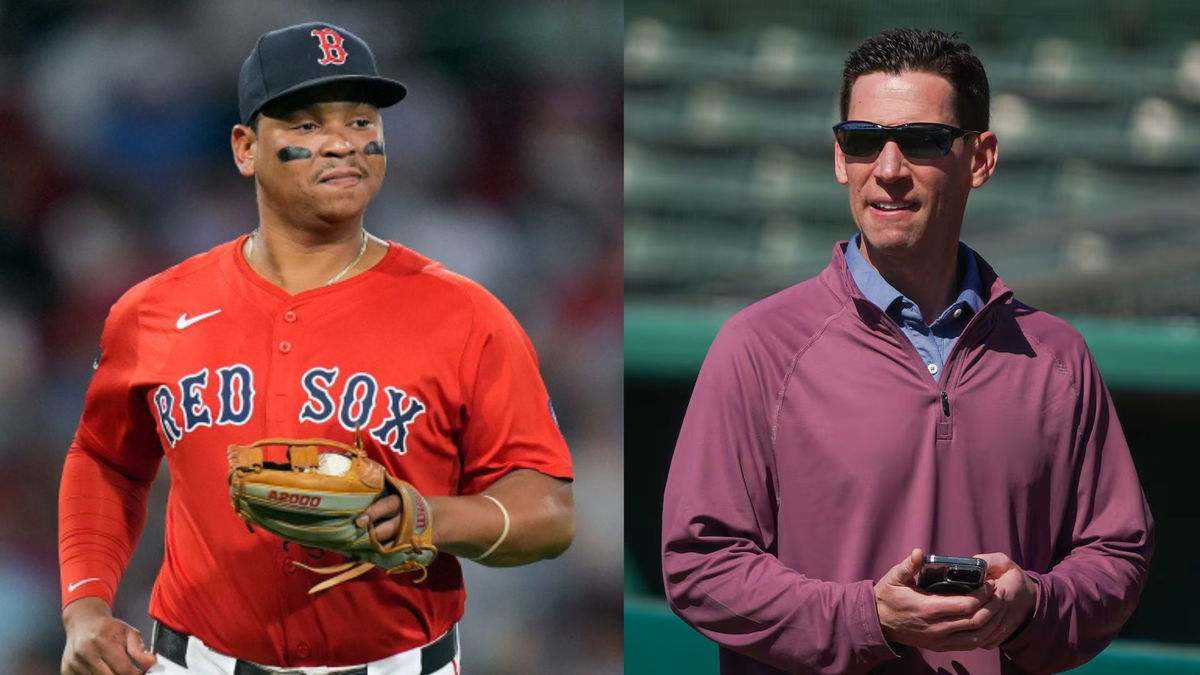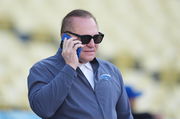
Imago
Credit: Michael Dwyer/Associated Press, Barry Chin/Globe Staff

Imago
Credit: Michael Dwyer/Associated Press, Barry Chin/Globe Staff
It started with a quiet storm behind closed doors, one that fans never saw brewing. Rafael Devers, long considered the offensive anchor of the Boston Red Sox, had already conceded his spot at third base to make room for the club’s shiny new signing, Alex Bregman. He moved to designated hitter, a role he never truly embraced, but accepted nonetheless. It was a shift that didn’t just impact positioning, it marked the beginning of a deeper rift between the team’s front office and its most prominent player.
Watch What’s Trending Now!
Then came the real explosion. When first baseman Triston Casas was ruled out for the season, Red Sox Chief Baseball Officer Craig Breslow approached Devers with another request: slide over to first base and fill the void. This time, Devers declined. And that refusal, while understandable to many, set off alarm bells inside the clubhouse and across Red Sox Nation. Suddenly, a conversation about infield defense turned into a referendum on leadership, trust, and whether this team is even rowing in the same direction.
“They had the conversation with me,” Devers told reporters, confirming what Breslow and manager Alex Cora initially tried to downplay. Devers feels like the team is flip-flopping on him. During spring training, they made it clear he was “put away my glove,” and that he wasn’t going to play any other position except DH. So now, after settling into that role, it’s a bit much to ask him to switch positions again.
ADVERTISEMENT
Also, Breslow was asked “if Roman Anthony could start playing first base in the minors, and he said Anthony has never played that position and wants to keep him where he feels comfortable.”
Red Sox GM Craig Breslow must have a personal issue with Devers. He was asked if Roman Anthony could start playing first base in the minors, and he said Anthony has never played that position and wants to keep him where he feels comfortable.
But Devers hasn’t played that…
— Mike Rodriguez (@mikedeportes) May 9, 2025
The quote landed hard, not because it threw anyone under the bus, but because it confirmed that Breslow had handled the matter internally, keeping his word to approach roster decisions respectfully. It also underlined just how much trust the organization had put in Devers. Breslow didn’t dictate; he discussed. And while the outcome wasn’t what he may have hoped, fans quickly picked up on one thing: Breslow did his part.
ADVERTISEMENT
When it comes to the first base situation, Devers thinks the front office should just go out and find someone else to fill that spot. Perhaps, he’s frustrated with the back-and-forth. “I’m not sure why they want me to be in between the way they have me now,” he added.
This has left many in Red Sox Nation rethinking their stance. “Breslow’s just trying to hold the team together,” one fan posted on social media. In fact, more and more supporters now believe that Breslow’s steady hand through a tricky clubhouse dynamic is a sign of leadership, not fault.
ADVERTISEMENT
Red Sox fan sentiment shifts: Is Craig Breslow the scapegoat?
In a season that demands unity, Boston instead finds itself split. The question now isn’t just whether Devers can adapt again—it’s whether he even wants to. And more importantly, the conversation between Breslow and Devers hasn’t just sparked a positional debate, it lit a fuse beneath deeper questions about accountability, communication, and leadership.
Making millions of dollars and he can’t and won’t change positions!!
Not a team player in my opinion
Trade him— thomas stillson (@thomasstil56832) May 9, 2025
ADVERTISEMENT
The frustration is palpable, and from this perspective, it’s hard to overlook. Here’s a player making millions (313.5 million, to be precise), yet refusing to adjust for the good of the team. The argument goes that Devers should be more flexible, especially when the team is in need. Some see his refusal to move positions as a lack of commitment to the collective effort, and for that reason, the call to trade him seems like a solution to the fans. They believe that when a player’s priorities don’t align with the team’s needs, the only recourse might be to find someone who’s willing to adapt.
Top Stories
Kevin Gausman’s Blue Jays Exit Appears Imminent as Ross Atkins Faces Framber Valdez Pressure

Jeff Hoffman Hit With Bitter Snub as Blue Jays Told to Chase Dodgers’ World Series Champion

Phillies to Lose $20M for Kicking 2X All Star & Silver Slugger Out of Philadelphia Clubhouse

Aaron Boone Put on Notice as Yankees’ Anthony Volpe Favoritism Refuses to Die Down, Per Insider

Blue Jays Told to Thwart Dodgers’ Plan After Scott Boras Pushes 24-Year-Old Star to Reject Reds’ Historic Deal

Please…..third to first is not a tough transition. He can learn the footwork – the rest is not difficult. Devers needs to grow up and put the team first. They picked the wrong guy to make their franchise player.
— Blake Elliott (@brelliott1) May 9, 2025
It’s a fair point, and many fans feel the same way. Moving from third to first isn’t a monumental shift, especially for a player of Devers’ caliber. The footwork might take some practice, but the rest of the job is manageable. The frustration lies in the perception that Devers is digging in his heels instead of stepping up for the team. For some, this situation highlights a bigger issue: if the Red Sox want to build around a true franchise player, they might have picked the wrong guy. A team-first mentality should be the foundation, and right now, Devers’ reluctance is raising serious doubts about his commitment.
ADVERTISEMENT
No. This is what’s best for the team. Take an experienced corner infielder and move them to the other corner then anyone can DH. Teach a non infielder how to play corner infield to please the DH? Nonsense. It’s a team sport. He’s not all in.
— 🇺🇦 Azovstal Avenger (@moporobbie) May 9, 2025
The decision to move an experienced corner infielder to the other side makes perfect sense. A seasoned player already accustomed to the demands of the infield can easily make that switch. While asking a non-infielder to suddenly step into a corner spot just to accommodate a DH is a whole different level of challenge. Baseball, at its core, is a team sport, and right now, it feels like Devers isn’t fully buying into that. His reluctance to adapt, especially when the team is in need, gives off the impression that he’s not all in, and that’s a problem when you’re supposed to be the franchise player.
Devers is being a diva. Grab the glove and go to 1st. His feelings are hurt they signed Bregman and he lost his position. Red Sox should have done their homework on his character before giving him that kind of contract.
— NYMetsMayhem (@NYMetsMayhem) May 9, 2025
ADVERTISEMENT
One fan took a jab at Devers by saying he is putting personal feelings ahead of team needs. The reality is, in a situation like this, grabbing the glove and stepping up to first should be part of being a team player, especially when the team is facing adversity. His reaction to Bregman’s signing, losing his spot at third, seems to have stirred more than just a position change; it looks like it’s been a blow to his pride. In hindsight, some fans argue that the Red Sox should’ve dug deeper into his character before locking him into that huge contract.
They are trying to develop Anthony, and he needs reps in his natural position to thrive. Throwing him into a new position could kill his confidence and hamper his development. Devers is a fully developed player who is not great at his natural position anymore.
— Huey Newton and the News (@dogpenetr8or) May 9, 2025
Another fan explained that the Red Sox focus on developing Anthony by giving him reps in his natural position, where he can thrive. Throwing him into a new role before he’s ready could derail his growth and shake his confidence, something the team can’t afford if they want him to reach his full potential. On the other hand, Devers is a fully developed player, but the reality is, his defense at third has been slipping. He’s not the same player at the hot corner that he once was, and his reluctance to move to first could be holding the team back. The dilemma isn’t just about position changes, it’s about doing what’s best for the team’s long-term success and Devers’ role in that equation.
ADVERTISEMENT
Ultimately, the Red Sox are at a crossroads where the team’s needs must come before individual pride. Now, if the Red Sox want to move forward, they’ll need to find a way to align their star player’s interests with the bigger picture.
ADVERTISEMENT
ADVERTISEMENT
ADVERTISEMENT